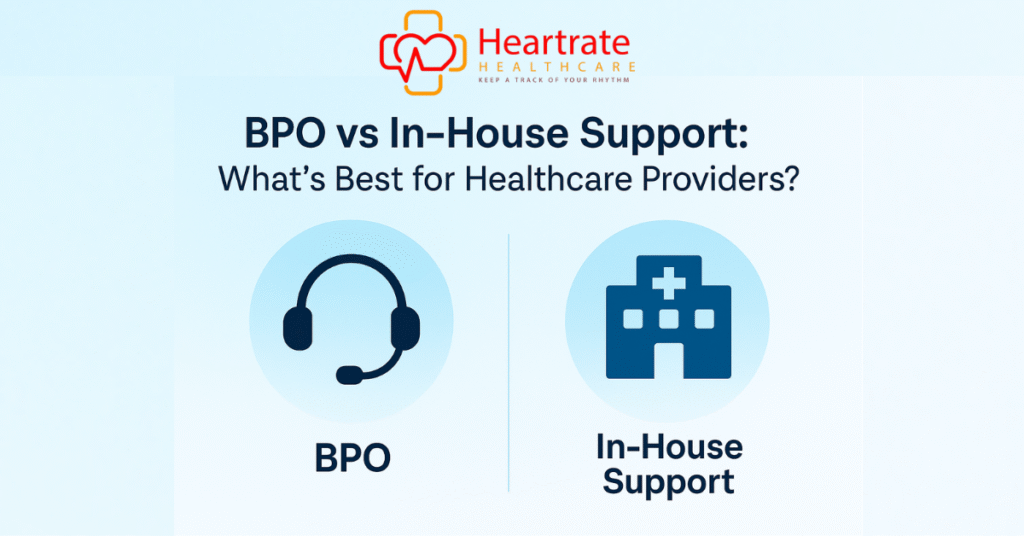In today’s fast-evolving healthcare environment, providers are under immense pressure to deliver top-quality care while managing rising operational costs. To meet these demands, many healthcare organizations are reevaluating their support models—specifically, whether to rely on Business Process Outsourcing (BPO) or maintain in-house support teams.
Both options come with distinct advantages and challenges. In this article, we’ll explore the key differences between BPO and in-house support, and help you decide which is best for your healthcare organization.
What is BPO in Healthcare?
Business Process Outsourcing (BPO) involves contracting third-party vendors to handle various non-clinical tasks such as:
-
Medical billing and coding
-
Patient scheduling and reminders
-
Insurance verification
-
Claims processing
-
Revenue cycle management
-
IT and tech support
-
Call center services
These services can be delivered onshore, nearshore, or offshore depending on the vendor’s location.
What is In-House Support?
In-house support refers to having full-time staff and infrastructure within the healthcare organization to manage administrative and support functions. This includes:
-
Internal billing departments
-
IT teams
-
Human resources
-
Medical receptionists
-
Internal call centers
This model offers greater control but often comes with higher overhead costs.
Key Differences
| Factor | BPO Support | In-House Support |
|---|---|---|
| Cost | Typically lower | Higher (salaries, benefits, etc.) |
| Scalability | Highly scalable | Limited by internal resources |
| Control | Less direct control | Full control over processes |
| Expertise | Specialized in healthcare tasks | May require training and development |
| Technology | Often includes latest tech tools | May lag if not regularly updated |
| Speed to Deploy | Quick setup with existing systems | Slower, requires hiring and training |
| Compliance | Must ensure vendor is HIPAA-compliant | Easier to monitor compliance |
Pros of BPO for Healthcare Providers
-
Cost Savings: BPO reduces costs related to staffing, infrastructure, and training.
-
Efficiency: Vendors specialize in administrative tasks, leading to quicker turnaround times.
-
Scalability: Easily scale operations up or down based on patient volume.
-
Focus on Core Functions: Healthcare providers can prioritize patient care over back-office operations.
-
Access to Global Talent: Tap into experienced professionals across the globe.
Cons of BPO in Healthcare
-
Less Control: Managing external teams may lead to oversight issues.
-
Security Risks: Data sharing raises concerns about HIPAA compliance and data breaches.
-
Quality Concerns: Inconsistent service levels depending on the vendor.
-
Communication Barriers: Time zone and language differences with offshore teams.
Pros of In-House Support
-
Full Control: Direct supervision of processes and staff.
-
Cultural Alignment: Teams are aligned with the organization’s mission and values.
-
Data Security: Easier to enforce data protection and privacy protocols.
-
Personalized Service: Better patient interaction with staff trained specifically for your organization.
Cons of In-House Support
-
High Operational Costs: Salaries, benefits, infrastructure, and training add up.
-
Limited Scalability: Scaling requires time, hiring, and budgeting.
-
Resource Drain: Administrative burden can take attention away from patient care.
-
Technology Challenges: Requires continual investment in software and IT infrastructure.
Which is Best for Healthcare Providers?
The answer depends on your organization’s size, goals, and challenges.
-
Large healthcare systems with heavy patient volumes may benefit from outsourcing specific tasks to increase efficiency and lower costs.
-
Smaller clinics or specialty practices may prefer the control and personalized approach of in-house support.
A hybrid model is also growing in popularity—keeping core patient-facing functions in-house while outsourcing billing, coding, and IT support to specialized BPOs.
Final Thoughts
BPO and in-house support both play crucial roles in modern healthcare. The right choice lies in aligning your support model with your business goals, budget, and compliance needs.
Before making a decision, assess:
-
Your current operational pain points
-
Your budget for support functions
-
Regulatory compliance requirements
-
The value of personalized patient experiences
The future of healthcare lies in flexibility. Whether you choose BPO, in-house, or a mix of both, your ultimate aim should be to enhance patient care while ensuring operational excellence.


